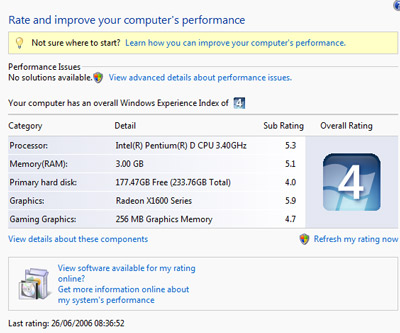Is Vista's Windows Experience Index fatally flawed?

Windows Vista has some complicated system requirements, especially when it comes to memory and graphics card performance. In an attempt to try to simplify things for user and buyers, Microsoft has bundled a utility into Vista called Windows Experience Index. The idea is that the Windows Experience Index examines key areas of the PC and assigns them a score between 1 and 5.9 and then uses this as a basis for a system rating (in fact, currently the lowest score is rounded down and used as the index). But is Vista's Windows Experience Index fatally flawed?
The Windows Experience Index examines five key areas of the system:
- Processor
- Memory (RAM)
- Primary hard disk
- Graphics
- Gaming graphics (memory)
Here is the score that my Vista system got when I initially installed Vista Beta 2, Build 5456:

But here's the score it got today:
In that time, nothing has changed on the system yet the score has dropped from a healthy 4 to an average 3. Now I don't really care about this score, but if it's supposed to give me a base score for the system, surely the number should be static. I can't find any reason why the score dropped, apart from the fact that the tool has changed the score that it gives to the system RAM.
OK, but that's not the only beef that I have with output generated by the Windows Experience Index.
- 32-bit Windows can only access 4GB of memory (in fact, 4GB is the total address space accessible under a 32-bit OS, so the amount of RAM that the system sees will be less than that), why is the score that my system, which has 4GB of RAM installed, not higher? This seems to indicate that the scoring scale for 32-bit and 64-bit versions of Vista will be based on the same scale, which doesn't make sense given that both the RAM requirements and maximum system RAM for 32-bit Vista is different to 64-bit Vista.
- Why does the Windows Experience Index only look at the capacity of the primary hard drive? Surely the total hard drive capacity of the entire system should be considered.
- Why are there two scores for graphics considered? Why not consider the graphics card and memory as one unit since there isn't all that variation in graphics RAM?
- No consideration is given to optical drives installed.
- No consideration given to networking capabilities.
While I think that Vista's Windows Experience Index is a step in the right direction, I really can't see the number outputted being of much use to anyone. Why? Because it's too simplistic. A single factor can skew the scoring such that the score in meaningless. You could have a PC with a powerful CPU, bags of RAM and a monster graphics card, and put those in a system that has 250GB hard drive (not a particularly shabby amount of space) and get a poor index rating as a result.
To be honest, I can't see the score that the Windows Experience Index generates being good for anything - it's certainly no good as an indication of what kind of hardware or software a system can run, and it's no good an as indicator as to whether a system can run Vista with the Aero Glass interface. It's also so vague that it's useless as a buying guide. Microsoft might release a tool at some point that allows users to enter different system configurations and get the Windows Experience Index score, but that information is no more useful.
But what about the sub-rating scores? Surely they're useful? Not really, unless hardware and software manufacturers actually start to use these numbers, which I don't see happening any time soon because it's easier and more accurate to use plain system requirements. But what about games? Will they adopt the scheme. No way! Games have some of the most complicated system requirements of all software sold, and they routinely list supported CPUs and graphics chipsets. There's no way that they are going to start simplifying these requirement listings because it's the equivalent of shooting in the dark.
So what use is the Windows Experience Index? Short of providing a tidbit of trivia about the system, it's meaningless.